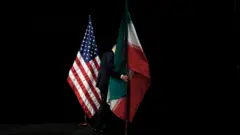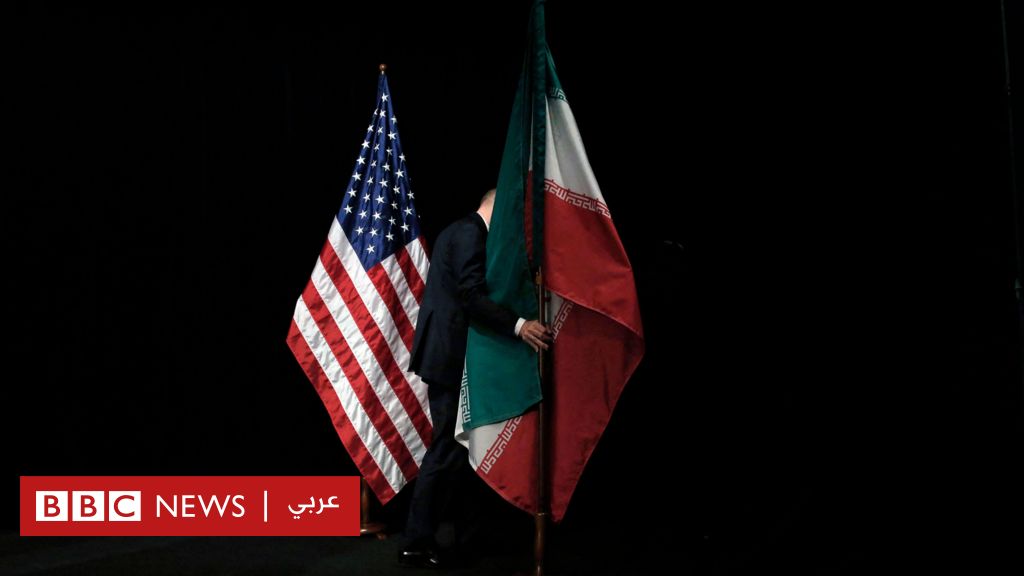
Photo released, Getty Images
Since the 1980s, the nuclear program of the Islamic Republic of Iran has been a major axis in its external relations, often characterized by international tension and anxiety.
From the disclosure of Natanz and Arak facilities in the early first decade of the twenty -first century, until the escalation of international sanctions, the Iranian nuclear file gradually turned into a central issue in its diplomacy. While official negotiations with three European countries began in 2003, the roots of nuclear tension and auditing are further.
The Iranian and American delegations held a fifth round of negotiations in Rome last week. Despite the emergence of limited progress signs, there are many points of disagreement that are difficult to overcome, especially the issue of Iranian uranium enrichment.
Below, we take a look at the main cities that have hosted these nuclear negotiations over the past two decades, each playing a unique role in the sophisticated scene of nuclear diplomacy.
Tehran: The beginning of official talks (2003)
In 2003, the UK, France and Germany foreign ministers visited Tehran, and they signed what was later known as Saadabad’s announcement with Iranian officials.
At that time, Iran voluntarily suspended uranium enrichment, while the European parties have pledged not to refer Iran’s file to the UN Security Council.
During the presidency of Mahmoud Ahmadinejad, Tehran also hosted a joint diplomatic initiative that included Iran, Brazil and Turkey. This effort led to a limited agreement that eventually did not reduce international sanctions.

Photo released, Getty Images
Brussels: Central Escopper Manufacturing Comment (2004)
This round of talks was held at the European Union headquarters in Brussels.
Its main result was an agreement to stop the manufacture and test of advanced centrifugal devices.
Paris: Stop Plutonium activities (2004)
In an agreement between Iran and the three European countries, Iran agreed to suspend activities related to the separation of plutonium.
On the other hand, the European Union pledged to support Iran’s accession to the World Trade Organization.
Geneva: A temporary agreement to reduce penalties (2013)
In November 2013, Iran and the 5+1 Group countries reached a temporary agreement whereby Iran stopped the enrichment of uranium by 20 percent, and some of its frozen origins were released.
This agreement was a step towards the final nuclear agreement known as the joint comprehensive work plan.
Bonn: Cooperation with the International Atomic Energy Agency (2005)
In the last months of the presidency of Mohamed Khatami, the German city of Bon has hosted talks that focused on addressing the concerns of the International Atomic Energy Agency on the suspected Iranian nuclear activities.
London: Announcement of the end of the talks (2005)
In the last round of negotiations during the era of President Khatami, London hosted talks during which Iran announced its intention to resume uranium enrichment.
This position was the beginning of a new stage of confrontation with the West.
Madrid and Lisbon: Pcient rounds
The Countries of Spain and Portugal hosted rounds of talks at various stages, but these meetings concluded without any concrete results or final agreements.

Photo released, Getty Images
Istanbul: failed attempts (2011 and 2012)
Despite the multiple negotiation tours between Iran and the 5+1 group, Istanbul talks failed to achieve results due to the deep differences on uranium enrichment and the lifting of sanctions.
Baghdad: Focus on fertilization by 20 percent (2012)
Amid regional tensions, Baghdad hosted negotiations that focused on Iranian uranium enrichment activities by 20 percent and relevant international concerns. Then the talks were transferred to Moscow.
Moscow: An invitation to close Fordo (2012)
During the talks in Moscow, the 5+1 negotiators demanded the closure of the Iranian Fordo Fordo facility and the suspension of its enrichment by 20 percent. However, no agreement has been reached.
Alami: A proposal to reduce penalties (2013)
In Alami, Kazakhstan, the 5+1 group offered a reduction in sanctions against Iran to stop uranium enrichment by 20 percent.
Iran considered the offer insufficient, and the negotiations ended without results.
Muscat: From secret talks to official negotiations (2013-2014)
Before the final agreement, Oman, by Sultan Qaboos, hosted secret negotiations between Iran and the United States.
These meetings paved the way for official talks between Iran and the 5+1 group.

Photo released, Getty Images
New York: A historic meeting of foreign ministers (2013)
On the sidelines of the United Nations General Assembly, then Iranian Foreign Minister, Mohammad Javad Zarif, and the US Secretary of State, John Kerry, publicly met for the first time since the 1979 revolution.
Lausanne: The political framework before the joint comprehensive work plan (2015)
In March 2015, Iran and the 5+1 group reached a political understanding in Lausanne on the basic conditions of the final agreement.
This understanding was the legal and technical basis for the joint comprehensive work plan.

Photo released, Getty Images
Vienna: Signing and reviving the comprehensive work plan (2015-2022)
In July 2015, the comprehensive nuclear agreement known as the joint comprehensive work plan was signed in Vienna.
After the withdrawal of the United States in 2018, most efforts were made to revive the agreement in this city as well.
Doha: indirect negotiations (2022-2023)
During the period of interruptions of direct talks between Iran and the United States, Qatar assumed the role of the mediator, as the representatives of the European Union transferred the proposals between the two sides.

Photo released, Getty Images
Does the added city affect the results of the nuclear talks?
A review of cities that have hosted Iranian nuclear negotiations over the past two decades reveals a diplomatic trip characterized by breakthroughs, stumbling and initial dialogues.
Each city represents a distinguished stage in Iran’s complex relationship with the global forces – from Tehran to Muscat, as some of them resulted in temporary agreements, while others ended on a dead end, while others were satisfied with keeping diplomatic channels open.
While the host cities played a role in shaping the path of the talks and their framework, the final results were largely relied on geopolitical dynamics and the political will of the parties concerned.

اترك تعليقاً